

Constantly late with work? Blame the planning fallacy - BBC Worklife. This tendency may be exacerbated by “motivated reasoning” – we often look only for the evidence that suits our goals, and it is often within our interests to feel that a project can be completed quickly and with less effort, leading us to ignore or dismiss clues that it might take longer.

We could tell ourselves that all our suppliers will be more reliable this time, or the transport problems that set us back last time were a one off, because we want to feel confident that the project will go more smoothly this time. Motivated reasoning could be a particular problem in businesses where people could be rewarded for unrealistically short deadlines, which might explain why it is particularly rife in IT. “It could be something to do with the need to be competitive to secure contracts and thus underestimating the costs involved when tendering,” says Kevin Thomas at the University of Bournemouth in the UK. Lifehack - The University of Life. DIKW pyramid.
Data, information, knowledge, wisdom hierarchy The DIKW pyramid, also known variously as the DIKW hierarchy, wisdom hierarchy, knowledge hierarchy, information hierarchy, and the data pyramid,[1] refers loosely to a class of models[2] for representing purported structural and/or functional relationships between data, information, knowledge, and wisdom.
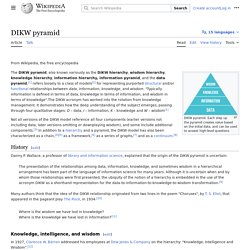
Want to Be More Productive? Try Doing Less. Quality System - Quality Management Plans. A Quality Management Plan documents how an organization will plan, implement, and assess the effectiveness of its quality assurance and quality control operations. Specifically, it describes how an organization structures its quality system, the quality policies and procedures, areas of application, and roles, responsibilities, and authorities. The elements of a quality system are documented in a Quality Management Plan. Both EPA organizations and organizations performing data collection activities funded by EPA are required to document their quality systems.
The Quality Management Plan is an organization or program-specific document; it describes the general practices of an organization or program. Project-specific details of individual projects of the organization or program are documented in a Quality Assurance Project Plan (see QA Project Plans). References Training. Knowledge Management basic information.
What Is Programme Management? Traditional Project Management approaches tend to look at a project as a discrete entity having its own set of resources (the budget and project team) and producing its own set of deliverables that deliver benefit to the organisation.
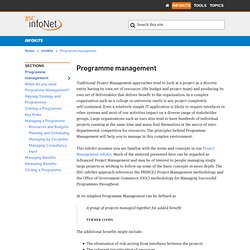
In a complex organisation such as a college or university rarely is any project completely self-contained. Even a relatively simple IT application is likely to require interfaces to other systems and most of our activities impact on a diverse range of stakeholder groups. Large organisations such as ours also tend to have hundreds of individual projects running at the same time and many find themselves at the mercy of inter-departmental competition for resources.
The principles behind Programme Management will help you to manage in this complex environment. This infoKit assumes you are familiar with the terms and concepts in our Project Management infoKit. Best Management Practice for portfolio, programme, project risk and service management. Change management. Change management is an approach to transitioning individuals, teams, and organizations to a desired future state.[1] In a project management context, change management may refer to a project management process wherein changes to the scope of a project are formally introduced and approved.[2][3] History[edit] 1960s[edit] Everett Rogers wrote the book Diffusion of Innovations in 1962.
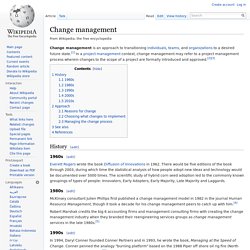
There would be five editions of the book through 2003, during which time the statistical analysis of how people adopt new ideas and technology would be documented over 5000 times. The scientific study of hybrid corn seed adoption led to the commonly known groupings of types of people: Innovators, Early Adopters, Early Majority, Late Majority and Laggards. 1980s[edit] McKinsey consultant Julien Phillips first published a change management model in 1982 in the journal Human Resource Management, though it took a decade for his change management peers to catch up with him.[4] 1990s[edit] 2000s[edit] Change management principles, process, tips and change theory and models.
Instead, change needs to be understood and managed in a way that people can cope effectively with it.
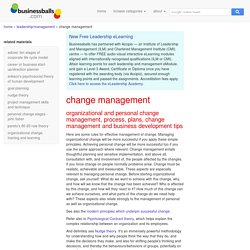
Change can be unsettling, so the manager logically needs to be a settling influence. Check that people affected by the change agree with, or at least understand, the need for change, and have a chance to decide how the change will be managed, and to be involved in the planning and implementation of the change. Use face-to-face communications to handle sensitive aspects of organisational change management (see Mehrabian's research on conveying meaning and understanding).
Encourage your managers to communicate face-to-face with their people too if they are helping you manage an organizational change. Email and written notices are extremely weak at conveying and developing understanding. If you think that you need to make a change quickly, probe the reasons - is the urgency real? Be mindful that the chief insecurity of most staff is change itself. Change Management infoKit - Overview and Introduction. Change is endemic in the education sector.
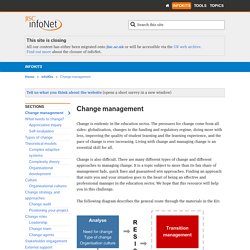
The pressures for change come from all sides: globalisation, changes to the funding and regulatory regime, doing more with less, improving the quality of student learning and the learning experience, and the pace of change is ever increasing. Change Management - HR Topics. Change management. The NHS is currently undergoing a period of intensive change - technological, social and economic - so there is a real need for all managers to facilitate this change within their organisations and the wider NHS environment.
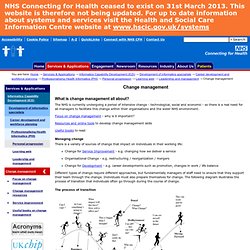
Change Management - Practical Strategies For Managing Change. Organizational Change Management Checklist.